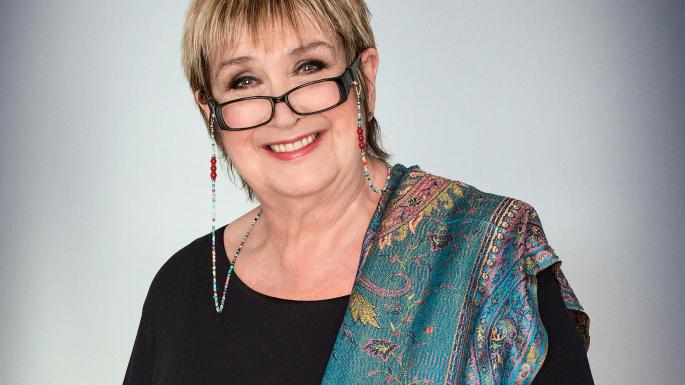Jenni Murray’s article in yesterdays Sunday Times suggests that men who undergo sex change operations cannot be “real women”. Previous similar claims have generated and angry response from transgender activists and Jenni says she “realises the implications of making such statements”.
The issue of gender is sensitive and it’s often difficult – particularly for older people- to understand, particularly as there is a whole new terminology associated with the blurring of gender boundaries.
Speaking to a friend who had been on the Women’s March in Washington recently, I was surprised when she told me she felt uncomfortable sharing some of the banners from the march on Facebook, as the women she had marched with thought it was unfair to trans women, as many of the banners had referred to pussies and they didn’t have them. I was shocked and then a little angry and replied “we grew up with periods and birthed children out of our vaginas therefore should be allowed to own at least that. I’m sympathetic to trans- women, of course but I draw the line at feeling guilty for having a vagina!!
Jenni Murray has been brave to speak out and I agree with most of what she is saying – but I wonder if this thinking is generational? Have a read and let us know what you think?
“Let me make something absolutely clear at the outset. I am not transphobic or anti-trans. Not a Terf in other words. That’s trans-exclusionary radical feminist, to use one of the often-confusing expressions that have entered the language in this age of gender revolution.
I’ll admit to feminist, but radical or separatist? No, on account of spending the past 37 years of my life as a woman married to a man and, together, raising two fine sons. I make my position plain because I know that in writing this article I am entering into the most controversial and, at times, vicious, vulgar and threatening debate of our day. I’m diving headfirst into deep and dangerous waters. I’ve no difficulty with men doing whatever they choose to express their feminine side. Indeed I welcome it. I find Grayson Perry and Eddie Izzard quite delightful and a glorious antidote to those men who obey the more familiar and often unpleasant rules required of conventional masculinity.
I firmly believe that transsexuals, transvestites, gays, lesbians and those of us who hold to the sex and sexual preference assumed at birth should be treated with respect and protected from the bullying and violence so many of us have suffered. But I do not approve of the more extreme statements that have been thrown around by both sides of the debate.
I can’t agree with Julie Burchill or Germaine Greer, whose language in their expression of revulsion at the trans woman (a man who becomes a woman) claiming to be a real woman has been unacceptably crude. Why demean yourself and the feminist politics to which you’ve devoted your life by saying, cruelly and distastefully, “Just because you lop off your penis … it doesn’t make you a woman,” (Greer) or referring to transgender females as “screaming mimis” and “bed wetters in bad wigs” (Burchill)?
Equally, I’m appalled at the repulsive misogyny evident in the response of trans activists who have accused Nimko Ali, a Somali and a courageous campaigner against female genital mutilation, of “practising white feminism” or who have demanded the “no platforming” (banning from speaking in public) of women, such as the lesbian feminist Julie Bindel, who have questioned the claims of trans women to be real women. But my concern, which I know is shared by numerous women who are now to be known as “cis” (short for “cisgender” — natural-born women, in the language that’s more familiar to most of us), is for the impact this question of what constitutes “a real woman” will have on sexual politics. And for who has the right to be included in gatherings or organisations that are defined as single sex.
The first time I felt anger when a man claimed to have become a woman was in December 2000, when the Rev Peter Stone announced he had undergone the radical surgery to transition from male to female and was now called Carol. Her primary concerns, she told me, were finding the most suitable dress in which to meet her parishioners in her new persona and deciding if she should wear make-up or not.
Her transition had taken place a mere six years after the Church of England ordained the first 32 women priests, at a time when the idea of a female bishop was still regarded as impossible and when parishes were allowed to refuse a female vicar if there were objections.
I remember asking Carol what she owed those women who had struggled for so long to have their calling to the priesthood acted upon. His calling, as a man, had never been questioned. I had nothing but a blank look and more concerns about clothing. “I know it sounds silly,” she said. “But I’ve nothing to wear.”
Too right it sounded silly. I thought of all those women who had spent years and years challenging what being female had meant as they sat in the pews on a Sunday morning: 2,000 years of institutionalised patriarchy; no woman but a virgin mother and a handful of tortured saints to look up to; women only good for refreshing the flowers, raising the kids and making tea for the vicar.
Even after women’s ordination had been allowed, the discrimination continued to rage. In 2000, the Rev Vivienne Faull became provost of Leicester Cathedral, the most senior woman in the Church of England at the time. She told me then that the church was awash with believers who thought a woman’s place was in the home or in a pew, wearing a hat. She had to contend with a canon who refused to celebrate services with her and would not receive holy communion from her hand.
I wondered when Carol would experience what so many newly ordained women had heard from fellow priests as they passed through the vestry. “Pulpit pussy”, they told me, was the favoured insult, and they found it demeaning, disgusting and it hurt.
It was news to Carol that life as a woman, especially a middle-aged woman, stepping into male territory in which she was unwelcome would be extremely tough. I prayed Carol would not find it so hard. Experience told me otherwise. It wasn’t going to be all about frocks and make-up. It was about sexual politics and feminism — ideas of which she seemed woefully unaware.
The fury that a male-to-female transsexual could be so ignorant of the politics that have preoccupied women for centuries hit me again last year — 16 years after I had met Carol. This time I was speaking to another trans woman, India Willoughby, who had hit the headlines after appearing on the ITV programme Loose Women.
India held firmly to her belief that she was a “real woman”, ignoring the fact that she had spent all of her life before her transition enjoying the privileged position in our society generally accorded to a man. In a discussion about the Dorchester hotel’s demands that its female staff should always wear make-up, have a manicure and wear stockings over shaved legs, she was perfectly happy to go along with such requirements. There wasn’t a hint of understanding that she was simply playing into the stereotype — a man’s idea of what a woman should be.
She described hairy legs on a woman as “dirty”. But hairy legs are not considered dirty in a man. Did she not know that the question of whether a woman should shave her legs or her armpits had been a topic of debate among women for an awfully long time? And that to describe a woman who chose not to shave as dirty was insulting and again suggested an ignorance of sexual politics?
Unsurprisingly, my polite and informed line of questioning exposed me to a barrage of criticism on social media. I was a Terf and didn’t understand what Simone de Beauvoir, the author of one of the great feminist tracts, The Second Sex, meant when she wrote: “One is not born, but rather becomes, a woman.”
As a matter of fact, I have understood perfectly what de Beauvoir meant ever since I read her as a teenage girl. Her subject was that “second sex”. She used the word sex advisedly.
Your sex, male or female, is what you’re born with and determines whether you’ll provide the sperm or the eggs in the reproductive process. What de Beauvoir was analysing was gendered socialisation.
In other words, the girl who grows into a woman goes through a lifetime of pressure to become the socially constructed idea of what a woman should be, regardless of her innate talents, abilities or ambitions. It’s what feminism has sought to challenge. She did not mean that an individual born into the male sex, socialised into the expectations of the masculine gender, can simply decide to take hormones and maybe have surgery and “become a woman”.
There are some trans women who willingly accept they cannot describe themselves as women and who agree that sex and gender are not interchangeable. I met Jenny Roberts about 15 years ago; she’s now 72 and made her transition, including hormone treatment and surgery, when she was 50.
“I’m not a real woman,” is the first thing she said to me in a recent conversation. “I understand that a lot of trans women want to believe they are women, but we’re not. We bring our male traits and habits with us. We’re taught as boys that assertiveness and aggression are good things in a man. There’s a danger, even now, that I will act as a man, for instance interrupting and leading a discussion. In a group of women I can become dominant. It makes it difficult for other women.
“I walk differently and I know I look quite male. I don’t have a woman’s waist or hips and I have broad shoulders. I’m often addressed as ‘sir’ on the phone. Yes, I’ve had the private part of my male body made to resemble a female body, but the maleness never really goes away. If I have a problem with my waterworks, my doctor has to know my origin and account for it in my treatment. It’s a hard thing to move from one gender to another, but it is as it is. I could be upset and angry, but I can live with it.”
As Bob, Jenny had been what she calls a late developer, although she’s aware that there are others who feel in childhood the sense of being different that she sensed in her twenties. She was married, then divorced, and married for a second time, a relationship that lasted 25 years and produced two children. She ran a successful printing business, but was increasingly drawn to wear her wife’s clothes and make-up in secret. “I needed to do it. I didn’t know why. I tried to stop, but I couldn’t put it back in the box.”
She began to split her life into two, partly living at home as Bob and partly travelling to Manchester as Jenny and hanging out as a transvestite in the gay community there.
“I was totally accepted and it felt wonderful to be able to be me. But the transvestites were happy to revert to being a man. It made me miserable. I began to realise I was transsexual not transvestite.”
Of course it was hard for her family. Her wife loved her husband, but her husband was gone. They separated. Her son said it didn’t matter to him whether she was male or female, but her daughter didn’t speak to her for several years. She’s grateful that her wife was kind and, eventually, she was reconciled with her daughter.
The most significant part of Jenny’s understanding of the trans woman/real woman debate came about as a result of her selling the printing business and, instead, opening a feminist bookshop in York, which she called Libertas. She read and understood everything that had been written about sex, gender and sexual politics. She got it and now lives happily with her civil partner, whom she describes as a “pretty radical lesbian feminist”.
“Of course I suffer discrimination as a woman,” she says. “All the little things — being sidelined in conversation with men, people offering to carry my cases for me, young men offering me seats. It’s done for the right conditioned reasons, but I never accept!”
There are numerous trans women who, like Jenny, have chosen to be “happy to be me and reclaim my past as a man”. Others, like Charles Kane, have found life as a woman intolerable. He began life as a man, became Samantha in 1997, and then, in 2004, had the surgery reversed. He believes he saw himself as an unusually sensitive man, but feels that he had surgery too soon. He said recently: “The worst part about being a woman is being treated as a sex object. So much depends on your appearance at the expense of everything else. Even though I was a woman physically, I felt I still had a male brain, but when I tried to talk to men about blokey things they didn’t take me seriously.”
Ah yes, the male brain. How often do we hear about the male or female brain and the oft-repeated mantra, applied to males and females alike, “I was born into the wrong body”. Research carried out by the distinguished scientists Cordelia Fine and Lise Eliot can find no evidence for such claims. They hold to the fact that all children are born with the potential to develop their own unique characteristics of behaviour, talent and personality, regardless of biological sex. They say that the idea that the brain and the body are split, meaning it is possible to have the brain of one sex and the body of the opposite, is very recent and is not supported by credible scientific evidence.
So what brings about the desire to switch gender? There are plenty of examples of boys dressing as girls and vice versa. I spent most of my childhood in dungarees because, even then, I could see boys had more freedom and I refused my mother’s exhortations to keep my knees together when I sat. The actor Rupert Everett told The Sunday Times Magazine last year how he dressed exclusively as a girl as a child. “Thank God the world of now wasn’t then because I’d be on hormones and I’d be a woman,” he said. “After 15 I never wanted to be a woman again. It’s nice to be able to express yourself, but the hormone thing, very young, is a big step.”
Miranda Yardley, like Jenny, is a male-to-female transsexual. She explains that some boys who are gay want to adopt the female gender because they’re considered effeminate and bullied for it. Others may simply refuse to become the kind of men they know, or want to emulate the mothers they love. Others, generally those who come to transition later in life, having lived as heterosexual men, are sexually aroused by the idea of becoming a woman or say they simply feel more comfortable living life as a woman.
Whatever the reason, the numbers have risen in recent years. At Charing Cross Hospital’s gender-identity clinic, the number of people seeking treatment has quadrupled in 10 years. At the Tavistock, which helps children, referrals rose last year from 697 to 1,398. Equally, the trans activists have enjoyed remarkable success in changing perceptions. Transgender issues was the first subject tackled by the parliamentary Women and Equalities Committee after it was established in 2015.
There’s a lot of fear, though. Numerous professionals in the field refused to talk to me, often quoting the experience of Kenneth Zucker, a Canadian psychologist who specialised in helping children and their families make their decisions about whether the child should transition or not. He was accused of employing the therapeutic tactics once used to persuade gay men that they were not homosexual. He has denied that this was the case. Nevertheless, he lost his job.
Stephanie Davies-Arai was prepared to talk. She is qualified to train teachers and parents in communication skills and runs a website called Transgender Trend. Her concerns centre on the power of the trans activists to shut down debate on the gender question. She mentions a line she hears often from parents, “I want a happy daughter, not a dead son,” inspired by a widely misinterpreted survey carried out in 2014 by the mental-health charity Pace. In its survey of more than 2,000 people in England, Pace had found that 59% of trans people aged 26 or under had considered suicide, 48% had actually attempted to kill themselves and 59% had self-harmed. The suicide risk was mentioned eight times in the House of Commons debate on transgender equality last December.
One charity, Mermaids, claimed that the Pace survey had been of 2,000 trans people — and this was widely shared on Twitter. But in fact Pace had surveyed 2,078 people of all sexualities and genders, — and only 27 of them were young people who identified as trans. So although the percentages were accurate — and, of course, it’s tragic that any young person should consider suicide — the number of young trans people surveyed was far smaller than many people realised.
Stephanie is also deeply concerned, as is Miranda, about the hijacking of language and single-sex spaces that are so precious to women. The Guides announced last month that any boy who “identified” as a girl could join the movement and trans women could become leaders. A worried parent who asked the NSPCC whether the charity would be concerned about any safeguarding issues — regarding the girls’ privacy or the risk of sexual harassment — was told there was none to worry about.
The British Medical Association now recommends that its employees do not refer to “expectant mothers”, but instead use the term “pregnant people” so as not to offend transgender people. Meanwhile the more radical trans activists want breast cancer and breastfeeding to be renamed “chest cancer” and “feeding”. Sorry, but I breastfed my kids and it was my breast that was cut off when I had cancer. No debate.
Miranda told me she would like to be empathetic and compassionate to the boy who “identifies” as a girl and wants to join the Guides, but personally thinks that for it to be regarded as progress is regressive. A female space should not be open to males. She asks: “Can someone who has lived as a boy, and then a man, with all the privilege that entails, really lay claim to womanhood and demand unrestricted access to women’s spaces like changing rooms and refuges — spaces that exist for the dignity, comfort and protection of women?”
Now that’s a “woman” after my own heart”.






A bold, brave statement from Jenni Murray, one I wholly agree with. As a woman (not in quotation marks) of her generation whose youth was filled with men telling me what I could not be or do as a women, I now find, in my later years, men “who identify as women” claiming my life experience, physically and mentally, has less (certainly no more) validity than theirs. When “Conundrum” was published by Jan (formerly James) Morris, women reviewers were astonished by her (?) delight in having doors opened, in wearing nail polish, etc. A male idea of women hood; certainly not most women’s.
I totally agree with Jenni Murray. This article has also made me angry. In an attempt to be politically correct and so careful about offending the trans women community we have devalued what it is to be a real woman , a real female and a real girl. “identifying” as a girl or woman does not equate with female life experience, perceptions, social expectations, female history and everything that comes with a genuine female body and mind.
I’m with Jenni, it’s an important point to make. Join the sisterhood trans people, you are welcome with open arms, but remember we’ve got quite a lot of shit to cope with already, we need you to be respectful of our issues too. We’re in this together, so lets all face the same way when we shout, because we’ll be stronger that way. A
I too am very much in agreement with Jenni on this issue. However, on a purely personal note, I actually worked for Jenny Roberts, at the time she was Bob, and he was a brilliant mentor and boss and I do believe that the feminine side of his make up played a huge role in the nurturing and encouragement of all his employees.
Go Jenni – the voice of reason. Surely it has all just gone too far ? Down here in NZ this is a total non-issue. Blokes are blokes etc not always a good thing for those that are a little different but I am so surprised to read about calls to rename breastfeeding etc – this is so demeaning for women, we have fought so hard to be respected and heard, this just feels like it is taking it all away – anyone that wants to can be a woman without any of the hard work that goes into it. Not happy.
I very much agree with all of you although Women’s Hour has seemed fixated on trans issues recently.
I welcome diversity and think it is a really good thing that gender expression seems much more fluid now. I think the main problem is self appointed spokes people given a platform to speak for a ‘community’ and the media loves a scrap.
There seems to be some very muddled thinking about identifying as a women. I am a human being first.
I totally agree with Jenni Murray. This article has also made me angry. In an attempt to be politically correct and so careful about offending the trans women community we have devalued what it is to be a real woman , a real female and a real girl. “identifying” as a girl or woman does not equate with female life experience, perceptions, social expectations, female history and everything that comes with a genuine female body and mind.
Be trans, be proud! Secrets Shop embraces diversity and inclusivity, offering a safe space for everyone to explore their desires. With their 100% Original Certified Intimate Health Safe Products, you can confidently embrace your identity and express yourself authentically. ️
At Secrets Shop, your privacy is paramount. Enjoy 100% confidentiality while ordering and receiving goods, ensuring a discreet and comfortable shopping experience.
Their commitment to individuality shines through their personalized approach to serving each client. Placing an order is a breeze, without leaving home, and you can choose from various online payment options. ️
Experience swift and reliable service with the fastest delivery throughout the UK, courtesy of trusted logistics partners. Your order can arrive just the next working day after placing it.
Rest easy knowing that each stage is carefully monitored, ensuring quality control from registration to receipt. You can track your order every step of the way. ️♀️ Secrets Shop ensures 100% safety and discretion. Your personal data, orders, and payments are protected. All orders come in opaque packaging, without any details about the store or contents, preserving your privacy. Discover a wide range of intimate products, like anal dildos for her, that are absolutely safe for your health and quality-certified. Embrace your true self, explore new horizons, and celebrate your journey with Secrets Shop. ❤️ https://secrets-shop.co.uk/sex-toys/female-sex-toys/dildos/anal-dildos-for-her/